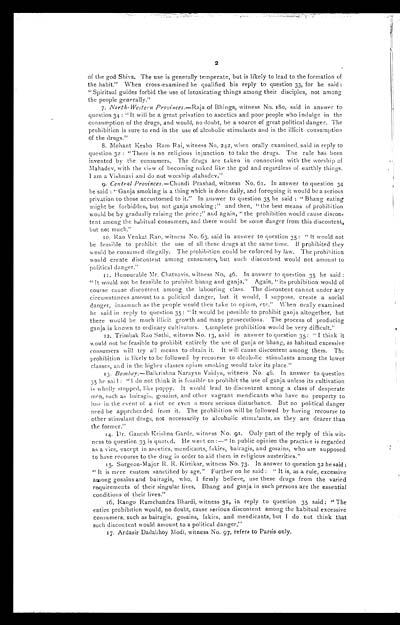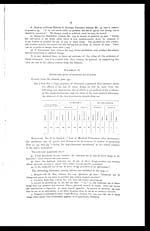Medicine - Drugs > Resolution. No. 1369 Ex. > Appendix to the Resolution
(30) Page 2
Download files
Individual page:
Thumbnail gallery: Grid view | List view

2
of the god Shiva. The use is generally temperate, but is likely to lead to the formation of
the habit." When cross-examined he qualified his reply to question 33, for he said:
"Spiritual guides forbid the use of intoxicating things among their disciples, not among
the people generally."
7. North-Western Provinces.—Raja of Bhinga, witness No. 180, said in answer to
question 34: "It will be a great privation to ascetics and poor people who indulge in the
consumption of the drugs, and would, no doubt, be a source of great political danger. The
prohibition is sure to end in the use of alcoholic stimulants and in the illicit consumption
of the drugs."
8. Mohant Kesho Ram Rai, witness No. 242, when orally examined, said in reply to
question 32: "There is no religious injunction to take the drugs. The rule has been
invented by the consumers. The drugs are taken in connection with the worship of
Mahadev, with the view of becoming naked like the god and regardless of earthly things.
I am a Vishnavi and do not worship Mahadev."
9. Central Provinces.—Chundi Prashad, witness No. 61. In answer to question 34
he said: "Ganja smoking is a thing which is done daily, and foregoing it would be a serious
privation to those accustomed to it." In answer to question 35 he said: "Bhang eating
might be forbidden, but not ganja smoking;" and then, "the best means of prohibition
would be by gradually raising the price;" and again, "the prohibition would cause discon-
tent among the habitual consumers, and there would be some danger from this discontent,
but not much."
10. Rao Venkat Rao, witness No. 63, said in answer to question 35: "It would not
be feasible to prohibit the use of all these drugs at the same time. If prohibited they
would be consumed illegally. The prohibition could be enforced by law. The prohibition
would create discontent among consumers, but such discontent would not amount to
political danger."
11. Honourable Mr. Chatnavis, witness No. 46. In answer to question 35 he said:
"It would not be feasible to prohibit bhang and ganja." Again, "its prohibition would of
course cause discontent among the labouring class. The discontent cannot under any
circumstances amount to a political danger, but it would, I suppose, create a social
danger, inasmuch as the people would then take to opium, etc." When orally examined
he said in reply to question 35: "It would be possible to prohibit ganja altogether, but
there would be much illicit growth and many prosecutions. The process of producing
ganja is known to ordinary cultivators. Complete prohibition would be very difficult."
12. Trimbak Rao Sathi, witness No. 13, said in answer to question 35: "I think it
would not be feasible to prohibit entirely the use of ganja or bhang, as habitual excessive
consumers will try all means to obtain it. It will cause discontent among them. The
prohibition is likely to be followed by recourse to alcoholic stimulants among the lower
classes, and in the higher classes opium smoking would take its place."
13. Bombay.—Balkrishna Narayan Vaidya, witness No. 46. In answer to question
35 he said: "I do not think it is feasible to prohibit the use of ganja unless its cultivation
is wholly stopped, like poppy. It would lead to discontent among a class of desperate
men, such as bairagis, gosains, and other vagrant mendicants who have no property to
lose in the event of a riot or even a more serious disturbance. But no political danger
need be apprehended from it. The prohibition will be followed by having recourse to
other stimulant drugs, not necessarily to alcoholic stimulants, as they are dearer than
the former."
14. Dr. Ganesh Krishna Garde, witness No. 91. Only part of the reply of this wit-
ness to question 33 is quoted. He went on:—"In public opinion the practice is regarded
as a vice, except in ascetics, mendicants, fakirs, bairagis, and gosains, who are supposed
to have recourse to the drug in order to aid them in religious austerities."
15. Surgeon-Major R. R. Kirtikar, witness No. 73. In answer to question 32 he said:
"It is mere custom sanctified by age." Further on he said: "It is, as a rule, excessive
among gosains and bairagis, who, I firmly believe, use these drugs from the varied
requirements of their singular lives. Bhang and ganja in such persons are the essential
conditions of their lives."
16. Rango Ramchandra Bhardi, witness 31, in reply to question 35 said: "The
entire prohibition would, no doubt, cause serious discontent among the habitual excessive
consumers, such as bairagis, gosains, fakirs, and mendicants, but I do not think that
such discontent would amount to a political danger."
17. Ardasir Dadabhoy Modi, witness No. 97, refers to Parsis only.
Set display mode to: Large image | Zoom image | Transcription
Images and transcriptions on this page, including medium image downloads, may be used under the Creative Commons Attribution 4.0 International Licence unless otherwise stated. ![]()
| India Papers > Medicine - Drugs > Resolution. No. 1369 Ex. > Appendix to the Resolution > (30) Page 2 |
|---|
| Permanent URL | https://digital.nls.uk/74934106 |
|---|
| Description | Examination of the evidence quoted in Lala Nihal Chand's Minute of Dissent |
|---|



![[Page 1]](https://deriv.nls.uk/dcn4/7493/74934105.4.jpg)
